BUDDHISTDOOR IN ENGLISH
You can read the third part of this article here
Título: Sacred Journey of the Heart ("Viaje sagrado del corazón")
Director: Cynthia Lukas
Year: 2012
Country: USA
Language: English
Genre: documentary
Duration: 80 minutes
Tradición: budismo e indígenas (sincretismo)
Temática: corazón y compasión global.
Sinopsis: explora prácticas espirituales de diversas tradiciones, incluyendo budismo, enfocadas en el corazón como centro de sanación y conexión humana.
--------------------------------
Título: Samsara ("Samsara")
Director: Pan Nalin
Year: 2001
Country: India
Language: Ladakhi
Genre: film, drama
Length: 145 minutes
Tradition: Buddhism
Theme: Spirituality, desire, inner search.
Synopsis: This drama explores the inner struggle between earthly desire and the search for enlightenment. The film follows the story of Tashi, a Buddhist monk who, after years in solitary retreat in the Himalayas, returns to his monastery and finds himself caught between his monastic life and the outside world. As Tashi confronts his human desires and falls in love with a young peasant girl, he must decide between following the path of renunciation or embracing the worldly life.
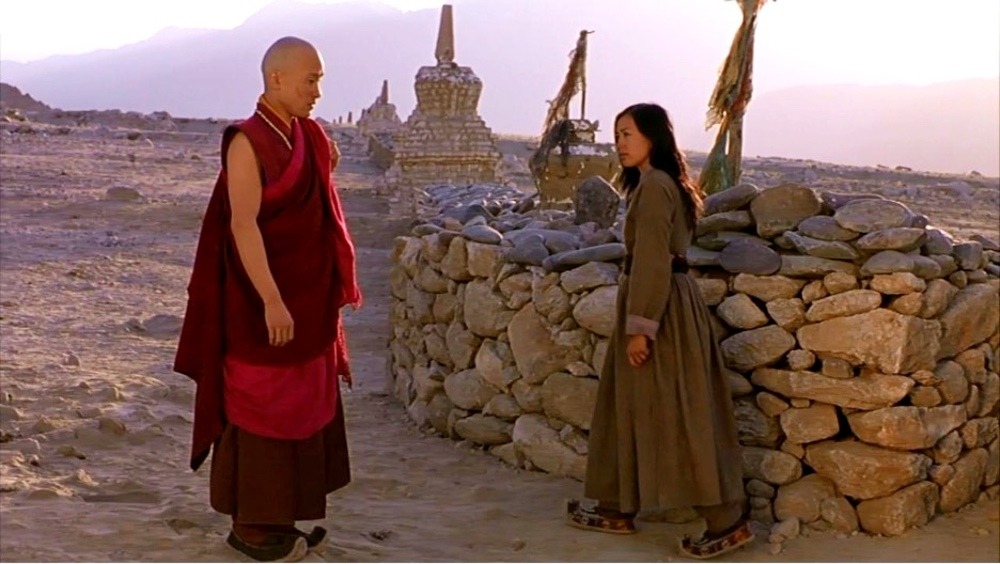
Título: Sandcastles: Buddhism and Global Finance ("Castillos de arena: Budismo y finanzas globales")
Director: Alexander Oey
Year: 2005
Country: USA
Language: English
Genre: documentary
Duration: [information not available]
Tradition: Tibetan nudism
Subject matter: Economics, ethics, spirituality.
Synopsis: This documentary considers the intersection between Buddhist principles and the world of global finance. Through interviews with economists, spiritual leaders and professionals in the financial sector, the film explores how Buddhist values of compassion, interdependence and detachment can offer a unique perspective on the workings of the global financial system.
--------------------------------
Título: Saving Mes Aynak ("Salvando Mes Aynak")
Director: Brent E. Huffman
Year: 2014
Country: USA
Language: English
Genre: Documentary
Duration: [Information not available]
Tradition: Buddhism
Subject matter: Archaeology, cultural heritage, conflict.
Synopsis: This documentary chronicles the struggle to save Mes Aynak, an ancient Buddhist archaeological site in Afghanistan, threatened by a Chinese mining project. Through archaeologists and activists, the film explores efforts to preserve this ancient heritage in the face of economic and political pressures, raising questions about cultural protection in conflict zones.
---------------------------------
Título: Seven Wonders of the Buddhist World ("Las siete maravillas del mundo budista")
Director: Faris Kermani
Year: 2011
Country: United Kingdom
Language: English
Genre: documentary
Duration: 55 minutes.
Tradition: Buddhism
Subject matter: History, culture, spirituality.
Synopsis: This documentary takes viewers on a journey through seven of the world's most iconic and sacred Buddhist sites. From the ancient Mahabodhi temples in India to the Great Buddha statue in Hong Kong, the film explores places of great spiritual and historical significance. Through stunning footage and interviews with experts, it offers an in-depth look at Buddhist teachings, their evolution and their impact on modern society.
---------------------------------
Title: Seven Years in Tibet ("Seven years in Tibet")
Director: Jean-Jacques Annaud
Year: 1997
Country: USA
Language: English
Genre: film, drama
Length: 139 minutes
Tradition: Tibetan Buddhism
Theme: Dalai Lama, Tibetan culture, personal transformation.
Synopsis: The film follows Heinrich Harrer, an Austrian mountaineer played by Brad Pitt, who escapes from a British prison camp during World War II and arrives in Lhasa, Tibet. There, he develops a transformative friendship with the young Dalai Lama. Through this relationship, Harrer learns about Tibetan culture, experiences a profound personal change and confronts his own prejudices. The film explores culture shock and spiritual growth in the context of Tibet before the Chinese invasion.
---------------------------------
Título: Shaolin Ulysses: Kung Fu Monks in America («Ulises Shaolin: monjes kung fu en América»)
Director: Rama Rao
Year: 2003
Country: USA
Language: English
Genre: documentary
Duración: 84 minutos
Tradición: budismo chan (contexto Shaolin)
Temática: choque cultural, disciplina, tradición y modernidad
Sinopsis: Sigue a monjes Shaolin durante una gira por Estados Unidos, mostrando el cruce entre entrenamiento, práctica espiritual e imagen pública en Occidente.
---------------------------------
Título: Shaolin (“Shaolin”)
Director: Benny Chan
Year: 2011
Country: China
Language: Chinese
Genre: action
Length: 131 minutes
Tradition: Buddhism
Subject: martial arts
Synopsis: The plot is set in China during a period of political and military turmoil, focusing on Hou Jie, an ambitious and proud warlord. After facing a betrayal that costs him his family, Hou Jie seeks refuge in a Shaolin temple. There, he adopts the principles of Buddhism and martial arts, allowing him to become a wiser and more compassionate person.
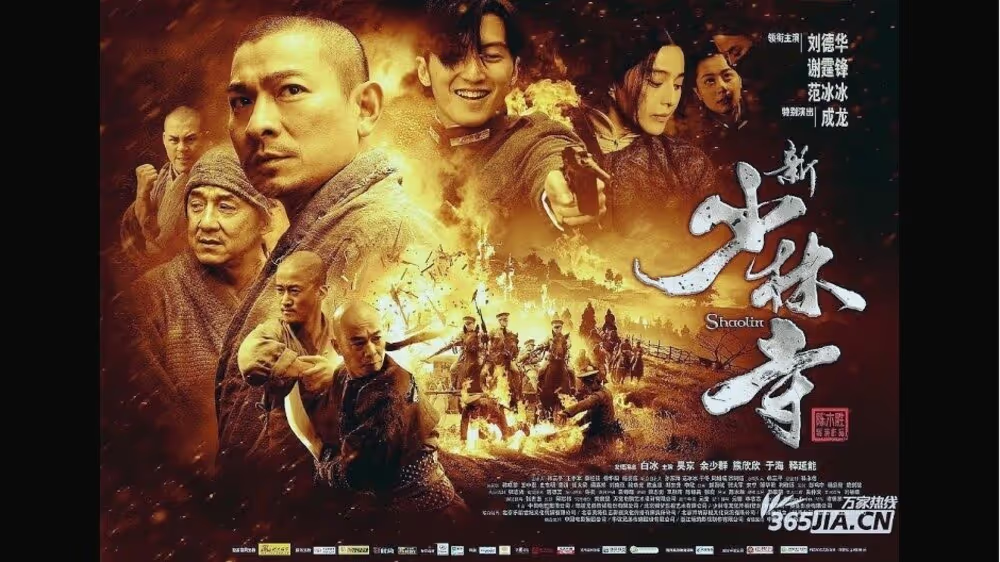
Title: Shinran: Path to Purity ("Shinran: Path to Purity")
Director: Rentarō Mikuni
Year: 1987
Country: Japan
Language: Japanese
Genre: drama
Duration: 140 minutes
Tradition: Japanese Buddhism
Thematic: addresses themes of faith, personal transformation and the search for spiritual purity.
Synopsis: The film centers on the life of Shinran, an influential 13th century Japanese Buddhist monk. The story chronicles his spiritual journey and his development of the Jōdo Shinshū school of Buddhism, which focuses on devotion to Amida Buddha as the path to enlightenment.
————————————————————————————————
Title: Shugendō Now ("Shugendō Now")
Director: Jean-Marc Abela y Mark Patrick Mcguire
Year: 2010
Country: Japan
Language: Japanese
Genre: documentary
Duration: Buddhism
Tradition: Japanese Buddhism
Thematic: search for authenticity and understanding of universal interdependence
Synopsis: Immersive documentary that takes the viewer to remote mountains of Japan, where practitioners of the ancient art of Shugendō embark on a path of asceticism and transformation. This syncretic practice combines elements of shamanism, Shintoism, Taoism and Tantric Buddhism, and focuses on the search for truth through intense rituals and meditations. As devotees climb sacred mountains, they purify their senses and revitalize their energy, finding a deep connection with nature and all living beings.
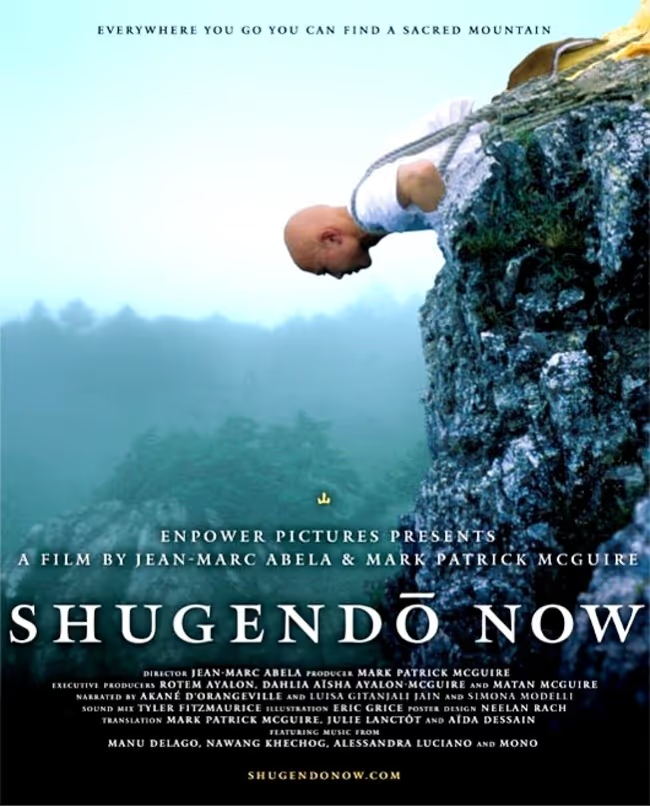
Title: Siddhartha ("Siddhartha")
Director: Conrad Rooks
Year: 1972
Country: USA
Language: English
Genre: drama, philosophy
Length: 89 minutes
Tradition: Buddhism
Theme: The film deals with issues of self-discovery, renunciation and the search for inner truth, providing a philosophical reflection on existence and spirituality.
Synopsis: Inspired by Hermann Hesse's famous novel, this film narrates Siddhartha's spiritual journey, during which he meets various characters that impact his path, such as a wise boatman, a prosperous merchant and the courtesan Kamala.
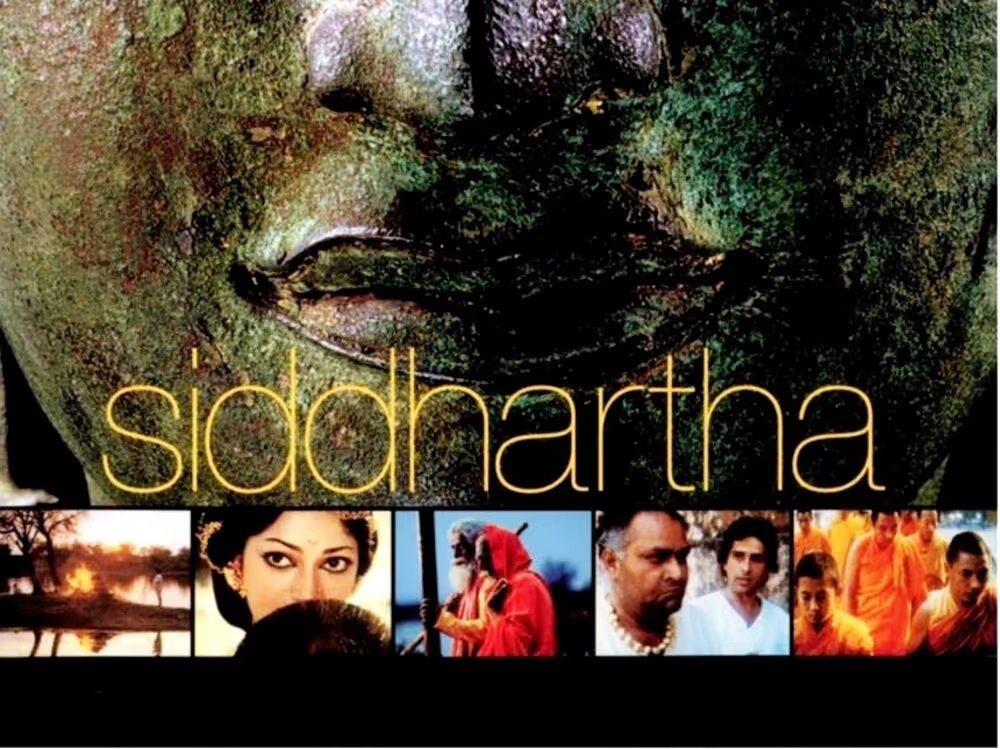
Title: Sisters of Ladakh
Director: Ricardo Lobo
Year: 2003
Country: India
Language: English
Genre: documentary
Duration: 52 minutes
Tradition: Buddhism
Subject: the role of women in Buddhism and life in women's monasteries.
Synopsis: This documentary examines the daily life of Buddhist nuns in a nunnery in Ladakh, a Himalayan region located between Tibet and India. Through interviews with various nuns, it considers questions about Buddhism and the position of women in society.
————————————————————————————————
Título: Sky Dancer (“Bailarín del cielo”)
Director: Jody Kemmerer
Year: 2011
Country: USA
Language: Tibetan
Genre: documentary drama, biography
Duration: 45 min
Tradition: Tibetan Buddhism
Synopsis: This is a documentary that explores the daily life and teachings of one of the great teachers of Tibetan Buddhism. In a world where ethnic and political tensions divide people, the film takes us into a community where Chinese and Tibetan students study together and are treated as equals.
Title: Souls of Zen ("Souls of Zen")
Director: Tim Graf
Year: 2012
Country: Germany
Language: German
Genre: documentary
Duration: 1 hour and 29 minutes
Tradition: Zen Buddhism
Thematic: "Souls of Zen" investigates how these spiritual and cultural traditions of Japan affect the way the Japanese cope with and overcome trauma and loss, highlighting the resilience and calmness that characterize their reaction to adversity.
Synopsis: The Japanese response to the March 2011 Tōhoku earthquake and tsunami has been described by Western media as "stoic." This behavior is deeply influenced by Buddhist traditions, which are an integral part of the code of conduct in Japan.
Título: Spirit of Tibet («Espíritu del Tíbet»)
Director: Matthieu Ricard
Year: 1992
Country: France
Idioma: francés/inglés
Genre: documentary
Duración: 45 minutos
Tradition: Tibetan Buddhism
Temática: cultura y resistencia en exilio.
Sinopsis: fotógrafo y monje Ricard documenta la vida tibetana en India, destacando rituales, meditación y la preservación de tradiciones ante la adversidad.
Title: Spring Summer Fall Winter Winter... And Spring ("Primavera, verano, otoño, invierno... y primavera")
Director: Kim Ki-duk
Year: 2003
Country: South Korea
Language: Korean
Genre: drama
Length: 103 minutes
Tradition: Zen Buddhism
Thematic: deals with spiritual development, redemption and the cyclical nature of existence.
Synopsis: The story examines the life cycle through a Buddhist monastery floating on a lake. It is structured around the seasons of the year, each symbolizing a different phase in the protagonist's life. The tranquil and visually stunning setting enhances the film's contemplative and philosophical tone, offering a reflection on the transience and continuity of life.
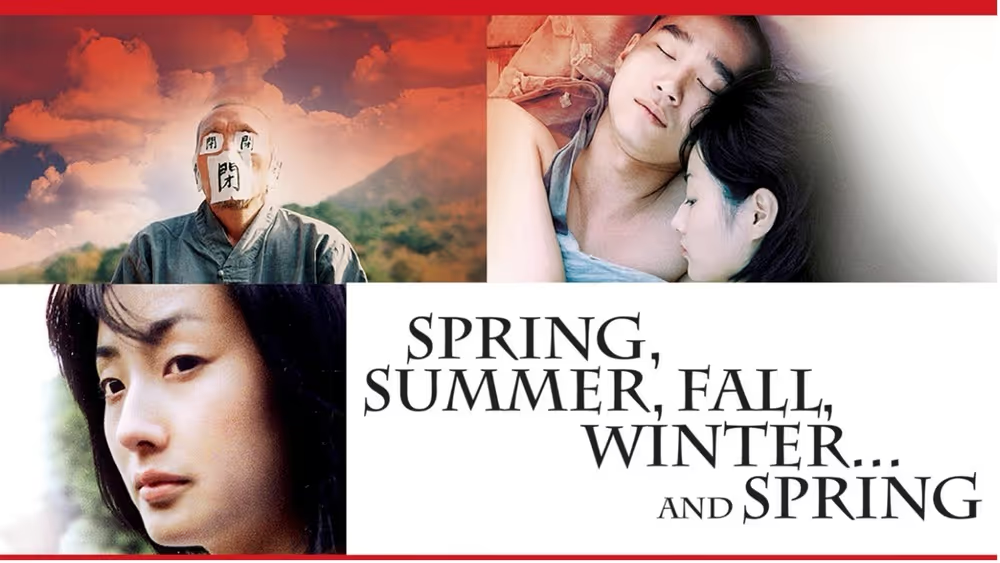
Title: States of Grace
Director: Helen S. Cohen and Mark Lipman.
Year: 2014
Country: USA
Language: English
Genre: documentary
Duration: 74 minutes.
Tradition: Buddhism
Theme: healing, transformation and the resilience of the human spirit.
Synopsis: Recounts the experience of Dr. Grace Dammann, a physician who has dedicated her life to caring for AIDS patients. Her life is turned upside down after a head-on accident on the Golden Gate Bridge, which causes her serious injuries. The documentary follows her extensive and arduous recovery process, both physically and emotionally, as she faces the challenges of adjusting to her new situation. The documentary relates to Buddhism primarily through the perspective and personal practices of Dr. Grace Dammann.
Title: Supermonk ("Supermonk")
Director: Shenang Gyamjo Tamang
Year: 2018
Country: Nepal
Language: Nepali
Genre: documentary
Duration: 18 minutes
Tradition: Buddhism
Theme: cultivation of Buddhist values
Synopsis: The journey of an eleven-year-old monk who discovers how to incorporate the Buddha's teachings of compassion and joy in an unusual way.
Title: Svaha: The Sixth Finger
Director: Jang Jae-hyun
Year: 2019
Country: South Korea
Language: Korean
Genre: suspense and mystery
Length: 122 minutes
Tradition: Buddhism
Subject: Investigation of suspected religious groups and their possible illegal activities
Synopsis: Park specializes in revealing the activities of suspicious religious cults. He is hired to observe the cult called Deer Mount. In parallel, police captain Hwang leads the investigation of a murder, in which the main suspect is linked to the Deer Mount cult. The story unfolds between the search for the truth and the inquiry into the beliefs and practices of this group, unveiling dark secrets that link both cases.
Title: Tashi and the Monk ("Tashi and the Monk")
Director: Andrew Hinton & Johnny Burke
Year: 2014
Country: Bhutan
Language: dzongkha
Genre: documentary
Duration: 39 minutes
Tradition: Buddhism
Theme: Promotion of Buddhist values
Synopsis: A man founds a special community for abandoned children, with the aim of providing them with the joys and experiences typical of childhood. Through this initiative, he seeks to cultivate Buddhist values and provide a loving and nurturing environment for the children.
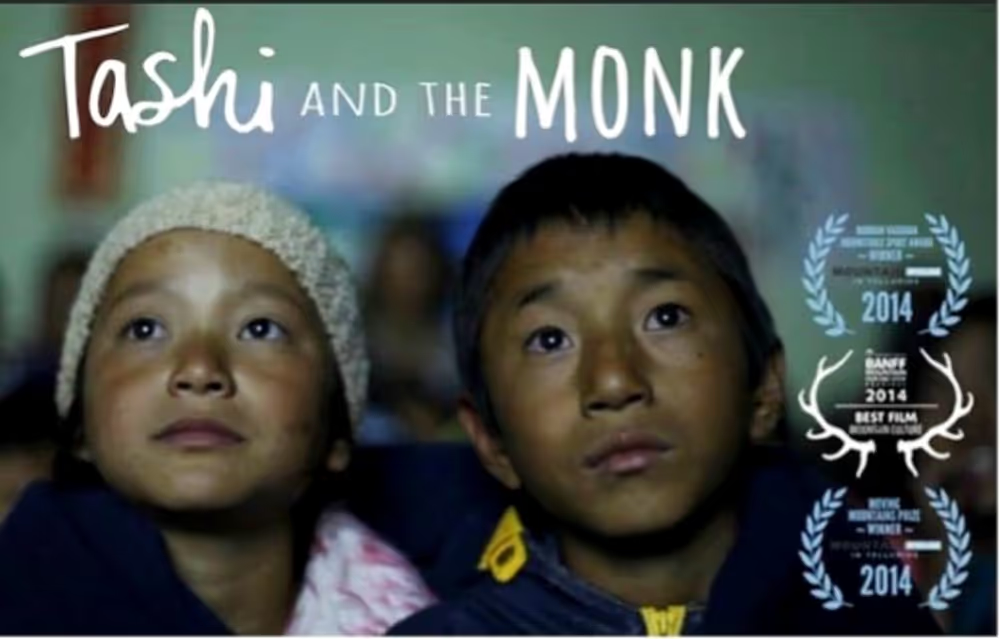
Title: Ten Questions for the Dalái Lama ("Ten Questions for the Dalái Lama")
Director: Rick Ray
Year: 2006
Country: USA
Language: English
Genre: documentary
Duration: 1 hour 25 minutes
Tradition: Tibetan Buddhism
Theme: Dalái Lama
Synopsis: The documentary follows Rick Ray as he travels through India in order to interview Tenzin Gyatso. Throughout the narrative, the film alternates between the present and recent episodes from the past, taking advantage of various stages of the journey to explore Tenzin Gyatso's personal history, the process of electing a Dalai Lama and Gyatso's journey into exile.
Título: The 37 Practices of a Bodhisattva («Las 37 prácticas de un bodhisattva»)
Director: Geoff Jukes
Year: 2006
País: Reino Unido/India
Idioma: inglés/tibetano
Genre: documentary
Duration: 100 minutes
Tradición: budismo tibetano (Mahayana)
Temática: ética y compasión
Sinopsis: Registra enseñanzas del XIV Dalái Lama en Bodh Gaya sobre el poema de Ngulchu Thogme Zangpo, alternando instrucción y devoción en lugares sagrados.
Title: The American Rinpoche
Director: Nikki Appino
Year: 2014
Country: USA
Language: English
Genre: documentary
Duration: 55 minutes
Tradition: Tibetan Buddhism
Synopsis: Presents the life of Gelek Rinpoche, a former Tibetan monk who became a citizen of the United States. Originally from mythical Shangri-la, his life has been remarkable, spanning different continents, traditions and cultures. Through historical images of ancient Tibet, taken by Rinpoche's father in the 1930s and 1940s, the film investigates the connection between his work as a spiritual teacher today and the influence of Tibetan myths and practices on Americans seeking guidance in an increasingly complex world.
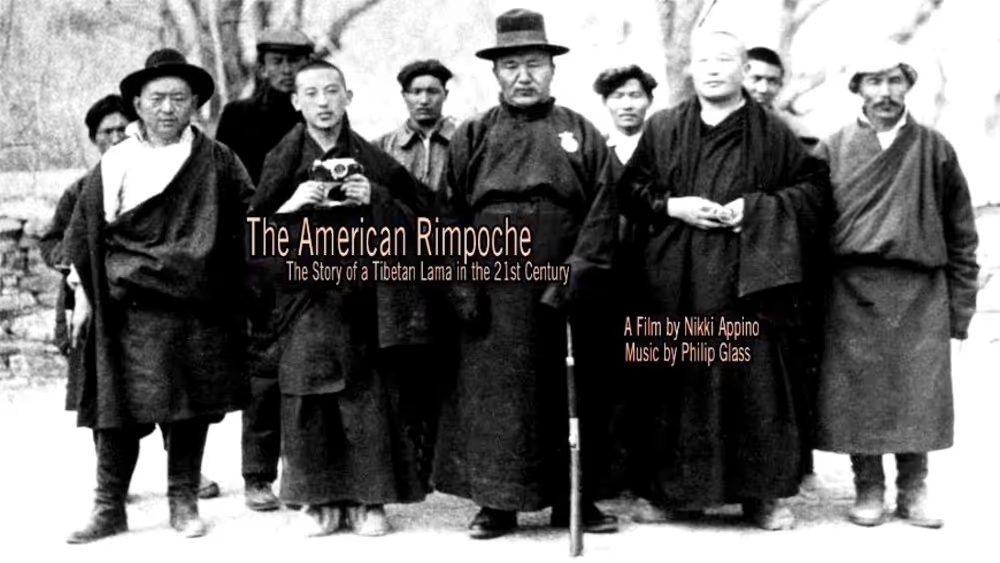
Title: The Buddha Collapsed Out of Shame
Director: Hana Makhmalbaf
Year: 2007
Country: Iran
Language: Persian
Genre: drama
Length: 81 minutes
Tradition: Buddhism
Themes: it addresses issues such as war, education, childhood innocence and the effects of religious extremism on everyday life.
Synopsis: The plot follows Baktay, a six-year-old Afghan girl living in the Bamiyan region, where the Taliban destroyed the iconic Buddha statues. Motivated by her neighbor Abbas, who attends school, Baktay decides she also wants to learn to read and write. However, her path to education is fraught with challenges, from a shortage of resources to confrontation with other war-playing children, reflecting the violence that surrounds them.
----------------------
Título: The Buddha: The Story of Siddhartha (“El Buda: la historia de Siddhartha”)
Director: David Grubin
Year: 2016
Country: USA
Language: English
Genre: documentary
Duration: 120 minutes
Tradition: Buddhism
Subject: examines the life and teachings of Siddhartha Gautama and his influence on today's world.
Synopsis: The film chronicles the life of Siddhartha Gautama, from his childhood as a prince to his transformation into the Buddha. Through interviews with experts, images of Buddhist art and historical accounts, the essential principles of Buddhism and their relevance in the contemporary context are analyzed. In addition, the documentary includes reflections on how the Buddha's teachings can offer answers to the personal and global challenges we face today.
----------------------
Título: The Burmese Harp (“El Arpa Birmana”)
Director: Kon Ichikawa
Year: 1956
Country: Japan
Language: Japanese
Genre: drama
Length: 116 minutes
Themes: war, peace, redemption and the search for humanity in times of conflict.
Synopsis: Set in the final days of World War II, the film tells the story of a platoon of Japanese soldiers in Burma. Mizushima, a harp-playing soldier, is separated from his unit and embarks on a spiritual journey after witnessing the devastation and suffering caused by the war. While posing as a Buddhist monk, he faces a moral dilemma between his duty to his comrades and his desire to devote his life to burying the dead.
----------------------
Title: The Civilization of Maxwell Bright
Director: David Beaird
Year: 2005
Country: USA
Language: English
Genre: drama
Length: Approximately 108 minutes
Tradition: Buddhism
Themes: redemption, love, spirituality, and the impact of Buddhism on a person's life.
Synopsis: The film tells the story of Maxwell Bright, a man with a strong character and misogynistic attitudes, who decides to "acquire" an obedient wife from China to serve him. However, his new wife, Mai Ling, is a woman of deep spirituality and Buddhist faith. Through her patience and wisdom, Mai Ling begins to influence Maxwell, leading him to reflect on his way of life and his beliefs. Their relationship begins a journey of self-discovery and redemption for Maxwell as he learns about authentic love and inner peace.
----------------------
Título: The Cup (“La Copa”)
Director: Khyentse Norbu
Year: 1999
Country: Bhutan
Language: dzongkha
Genre: comedy
Length: 93 minutes
Tradition: Tibetan Buddhism
Themes: culture, globalization, youth, passion for soccer, and life in a Buddhist monastery.
Synopsis: The film narrates the experiences of a group of young Tibetan monks residing in a remote monastery in India who develop an enthusiasm for soccer, especially for the World Cup. The protagonist, Orgyen, is a young monk with a mischievous character who, together with his companions, does everything possible to watch the World Cup matches, even if this goes against the rules of the monastery. The story deals with the conflict between tradition and modernity, offering a humorous and touching insight into the influence of popular culture on monastic life.
----------------------
Título: The Departure (“La Partida”)
Director: Lana Wilson
Year: 2017
Country: USA
Language: English
Genre: documentary
Length: 87 minutes
Tradition: Zen Buddhism
Themes: life, death, spirituality, suicide prevention, and the search for meaning.
Synopsis: The documentary follows Ittetsu Nemoto, a Japanese Zen Buddhist priest who is dedicated to helping suicidal people find new meaning in their lives. Through workshops and counseling sessions, Nemoto offers emotional and spiritual support to those in crisis. However, as he dedicates himself to saving others, Nemoto faces his own personal and health challenges, forcing him to reflect on the balance between his mission and well-being.
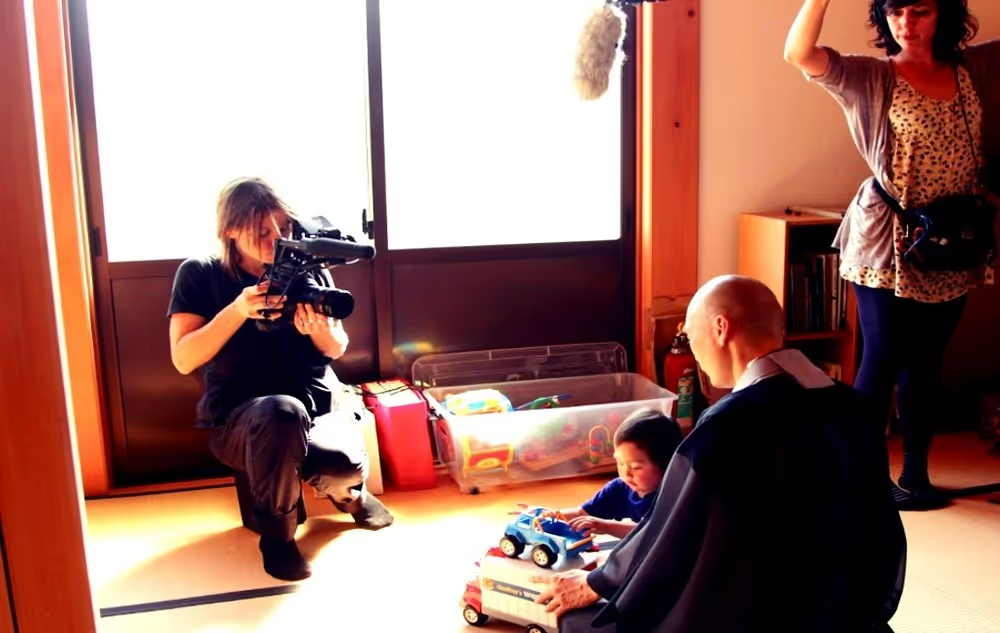
Title: The Dhamma Brothers
Director: Jenny Phillips, Anne Marie Stein, Andrew Kukura
Year: 2007
Country: USA
Language: English
Genre: documentary
Length: 76 minutes
Tradition: Buddhism
Subject: The documentary focuses on the practice of Vipassana meditation inside a maximum security prison in Alabama. It deals in depth with the transformative impact of this practice on inmates and how it influences their behavior and outlook on life.
Synopsis: "The Dhamma Brothers" documents the experience of a group of prisoners at Donaldson Prison who participate in a 10-day intensive course of Vipassana meditation. Through interviews and observations, the film shows how this practice offers them a new vision of introspection and inner tranquility, challenging the difficult conditions of the prison environment. The documentary highlights the emotional and psychological changes experienced by the inmates and raises questions about rehabilitation and the potential of meditation as a tool for personal transformation.
----------------------
Título: The GateKeeper of Enmyoin (“El Guardián de Enmyoin”)
Director: Naoaki Maeda
Year: 2008
Country: Japan
Language: Japanese
Genre: documentary
Duration: 95 minutes
Tradition: Buddhism
Theme: The life and practices of a Buddhist monk who serves as the guardian of the Enmyoin temple. Focuses on Buddhist traditions and rituals, as well as the daily life of the monk and his interaction with the local community.
Synopsis: "The Guardian of Enmyoin" offers an intimate perspective on the life of a Buddhist monk in Japan, dedicated to preserving traditional practices and teachings at the Enmyoin temple. Through his daily routine and commitment to the community, the documentary highlights the importance of spirituality and cultural continuity in the modern world. The film highlights the challenges and rewards of living a life centered on service and meditation in the context of an ever-changing society.
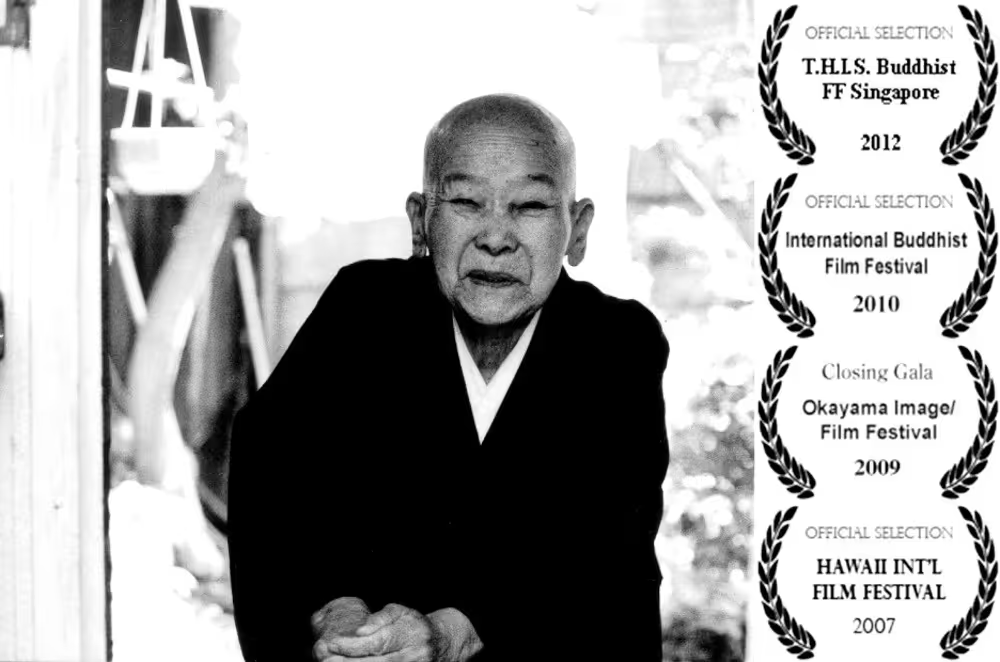
Title: The Golden Land of Myanmar
Director: Cathy Korson
Year: 2014
Country: Myanmar
Language: Burmese
Genre: documentary
Duration: 1 hour and 3 minutes
Tradition: Buddhism
Subject matter: Preservation of Buddhist traditions in Suvananabhumi, Myanmar.
Synopsis: This film takes viewers to Suvananabhumi, the Golden Land in the Mon State of Myanmar (Burma). This land has remained a hidden treasure, untouched by the modern world. The film shows rare footage of its communities, countryside and ancient Buddhist pagodas, which have remained almost unchanged since Buddhism arrived over 2500 years ago. It is a sanctuary that protects the practice and principles of Buddhist doctrine, which remain as simple and sublime as in ancient times. Travel to this place of peace, tranquility and compassion for a unique insight into an ancient Buddhist land.
----------------------
Título: The Great Buddha+ («El gran Buda+»)
Director: Huang Hsin-yao
Year: 2017
País: Taiwán
Idioma: mandarín/taiwanés (hokkien)
Género: película; comedia negra, drama
Length: 102 minutes
Tradición: budismo (imaginería; marco cultural)
Temática: desigualdad, corrupción, moralidad
Sinopsis: Dos trabajadores de un taller de estatuas de Buda se topan con secretos de las élites locales, en una sátira sobre poder, precariedad y conciencia.
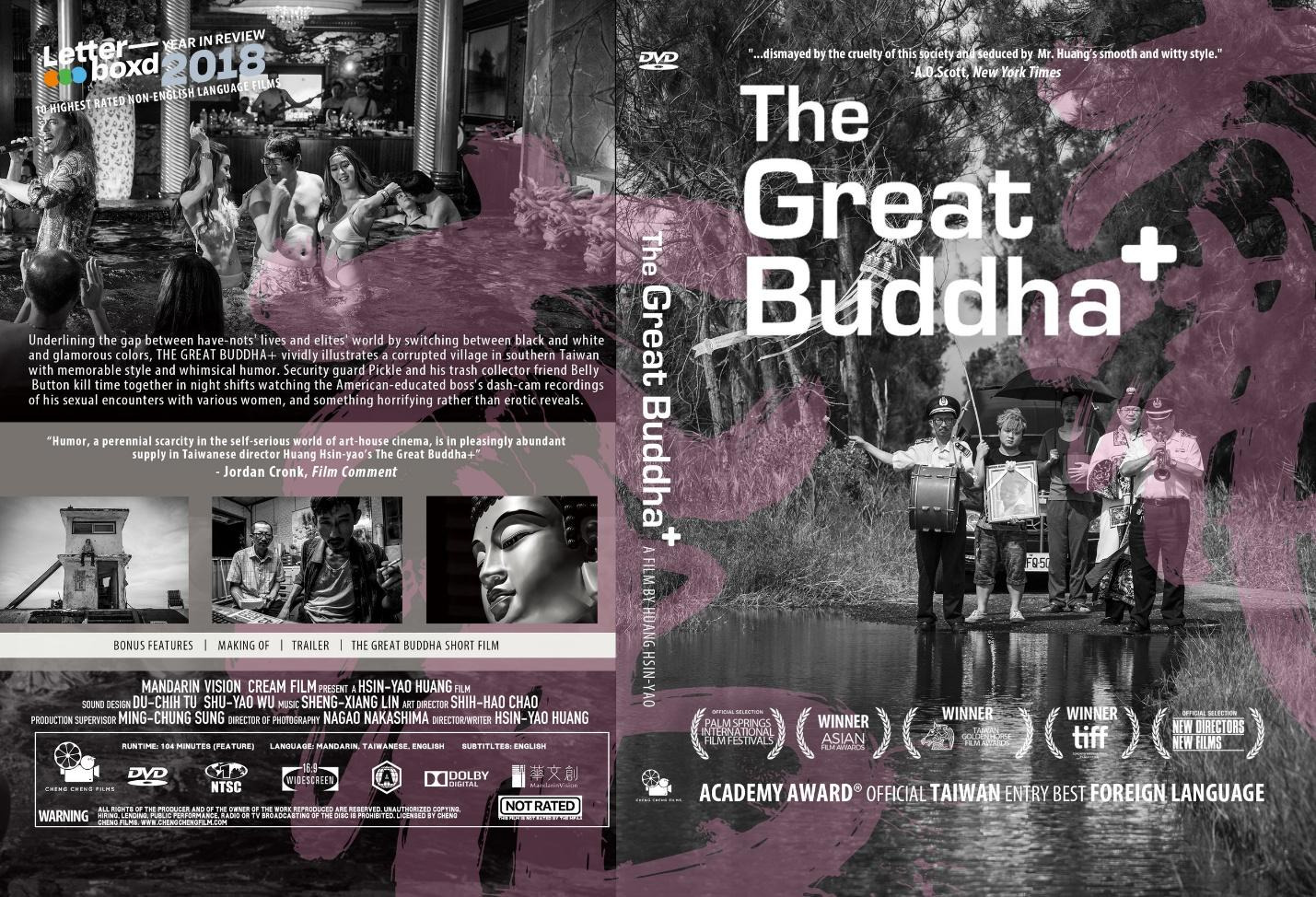
Título: The Great Pilgrim (“El Gran Peregrino”)
Director: Jin Tiemu
Year: 2009
Country: China
Language: Chinese
Genre: documentary
Length: 98 minutes
Tradition: Buddhism
Themes: Buddhism, pilgrimage, spirituality, Tibetan culture.
Synopsis: The documentary explores themes of Buddhism, pilgrimage, spirituality and Tibetan culture, following the journey of Tibetan Buddhist devotees on their way to a sacred site. It highlights the pilgrims' devotion, resilience and search for enlightenment, as well as the strength they find in their faith and community. Through breathtaking landscapes and moments of reflection, it captures the essence of pilgrimage as an act of faith and personal transformation.
----------------------
Título: The Last Dalái Lama? (“¿El Último Dalái Lama?”)
Director: Mickey Lemle
Year: 2016
Country: USA
Language: English
Genre: documentary
Length: 82 minutes
Tradition: Tibetan Buddhism
Themes: the life and teachings of the Dalai Lama, the continuity of the Dalai Lama's lineage, and the political and spiritual challenges facing Tibet.
Synopsis: The documentary explores the life of the 14th Dalai Lama, Tenzin Gyatso, addressing both his spiritual contributions and his role as a political leader in exile. Through intimate interviews and personal reflections, the film focuses on the Dalai Lama's concerns about the future of Tibet and the possibility that he may be the last Dalai Lama. The film also highlights his focus on compassion, forgiveness and the search for inner peace.
----------------------
Title: The Lost World of Tibet
Director: Emma Hindley
Year: 2007
Country: United Kingdom
Language: English
Genre: documentary
Duration: 1 hour and 30 minutes
Tradition: Tibetan Buddhism
Subject: history
Synopsis: Presents previously unpublished archival color footage from 1940s and 1950s Tibet, showing life in the Himalayan kingdom. The footage, which includes religious ceremonies and scenes of daily life, is annotated by the current Dalai Lama, who offers his recollections of that era.
----------------------
Title: The Medicine Buddha
Director: Benjamin D. Johns
Year: 2019
Country: Mongolia
Language: Mongolian
Genre: documentary
Duration: 1 hour and 50 minutes
Tradition: Tibetan Buddhism
Subject: Mongolian Buddhism
Synopsis: This documentary, narrated by Academy Award winner Sir Ben Kingsley, is a cinematic portrait of the renowned Mongolian Buddhist leader, Khamba Lama Natsagdorj. Faith and science are reconciled as we immerse ourselves in the Lama's tireless humanitarian efforts. The film is a valuable introduction to Mongolia's rich cultural and religious heritage, customs and daily life. It also touches on Buddhist philosophy and local traditional medicine.
-----------------------
Title: The Mindful Revolution
Director: Samuel Stefan
Year: 2015
Country: USA
Language: English
Genre: documentary
Duration: 59 minutes
Topic: mindfulness meditation
Synopsis: The transformation that mindfulness meditation has brought to the business world, a critical examination that reveals what lies behind the facade of this modern spiritual phenomenon. This analysis seeks to unravel how this practice, which has become popular in the corporate world, is influencing work and personal dynamics, and what implications it has beyond its superficial appearance.
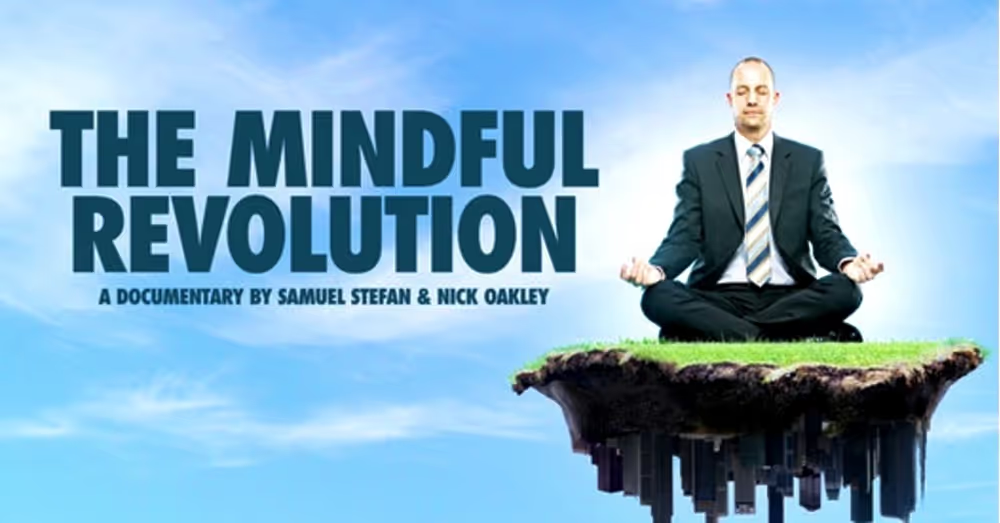
Título: The Monk («El Monje »)
Director: Maw Naing Aung
Year: 2014
Country: Myanmar
Language: Burmese
Genre: documentary
Duration: 1 hour 33 minutes
Tradition: Theravada Buddhism
Subject matter: internal conflict in the context of religious traditions and social changes.
Synopsis: Zawana, a teenager raised in a remote Burmese monastery by the strict abbot U Dahma, faces a crucial decision about his future. He must choose between staying to care for Dahma, joining another novice who seeks a more lenient monastery in the city, or pursuing a relationship with a village girl who moves to Rangoon. This film explores Zawana's internal struggle, reflecting broader social changes in Burma.
-----------------------
Título: The Monk and the Fish («El monje y el pez»)
Director: Michael Dudok de Wit
Year: 1994
Country: France
Idioma: sin diálogo
Género: animación (cortometraje)
Duración: 7 minutos
Tradición: budismo zen (inspiración)
Temática: atención, perseverancia, deseo y transformación
Sinopsis: Un monje intenta atrapar un pez que altera la calma del templo; la persecución se convierte en una parábola visual sobre la mente y el apego.
-----------------------
Título: The Monk and the Gun («El monje y el arma»)
Director: Pawo Choyning Dorji
Año: 2023
Country: Bhutan
Language: dzongkha
Género: película; comedia dramática
Duración: 107 minutos
Tradición: budismo tibetano (contexto cultural butanés)
Temática: modernidad, política, ética, comunidad
Sinopsis: La llegada de la democracia a un valle remoto desata cambios; un lama pide a sus monjes conseguir un arma, detonando dilemas morales y culturales.
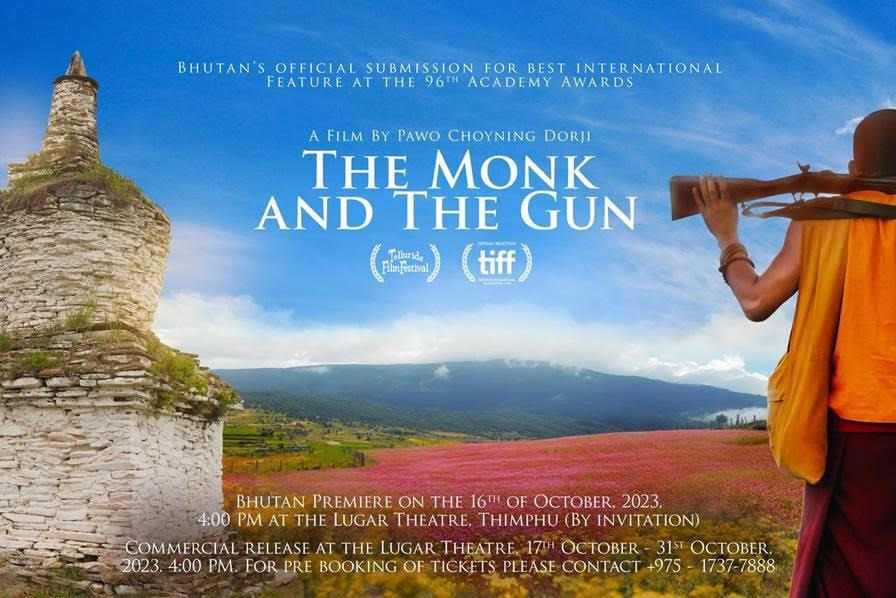
Título: The Next Guardian («El próximo guardián»)
Director: Arun Bhattarai, Dorottya Zurbó
Year: 2017
Country: Bhutan
Language: dzongkha
Genre: documentary
Duration: 1 hour 15 minutes
Tradition: Tibetan Buddhism
Theme: clash between tradition and individual aspirations.
Synopsis: 13-year-old Tashi has only one desire: to excel, either as a soccer player or as the future guardian of his family's monastery in Bhutan. In this context, the dreams of two generations collide in the microcosm of an ancient Buddhist monastery in Bhutan, when Gyembo, an ordinary teenager, is chosen by his father to be the next guardian of the family monastery.

Title: The Practice of the Wild
Director: John J. Healey
Year: 2010
Country: USA
Language: English
Genre: documentary
Duration: 53 minutes
Tradition: Zen Buddhism
Theme: Reflections on interconnections between ecology and Zen Buddhism
Synopsis: This portrait of beat poet Gary Snyder highlights his connection to nature and the power of literature. It combines the bohemian life of the San Francisco Bay Area, Zen Buddhism, and reflections on ecology and spirituality, with the precision of a well-crafted stanza.
------------------------
Título: The Saltmen of Tibet («Los salineros del Tíbet»)
Directora: Ulrike Koch
Year: 1997
Country: Switzerland
Language: Tibetan
Genre: documentary
Length: 101 minutes
Tradición: budismo tibetano (contexto cultural)
Temática: oficio tradicional, comunidad, paisaje sagrado
Sinopsis: Retrato de una comunidad del altiplano tibetano dedicada a la extracción de sal, donde trabajo y vida cotidiana se entrelazan con la continuidad de la tradición.
------------------------
Título: The Silent Holy Stones ("Las piedras sagradas silenciosas")
Director: Pema Tseden
Year: 2005
Country: China
Language: Tibetan
Género: película; drama
Length: 102 minutes
Tradition: Tibetan Buddhism
Temática: infancia, vida monástica, tradición y modernidad
Sinopsis: Un niño que vive en un monasterio tibetano vuelve a casa y enfrenta el cruce entre prácticas religiosas, vida familiar y cambios culturales contemporáneos.
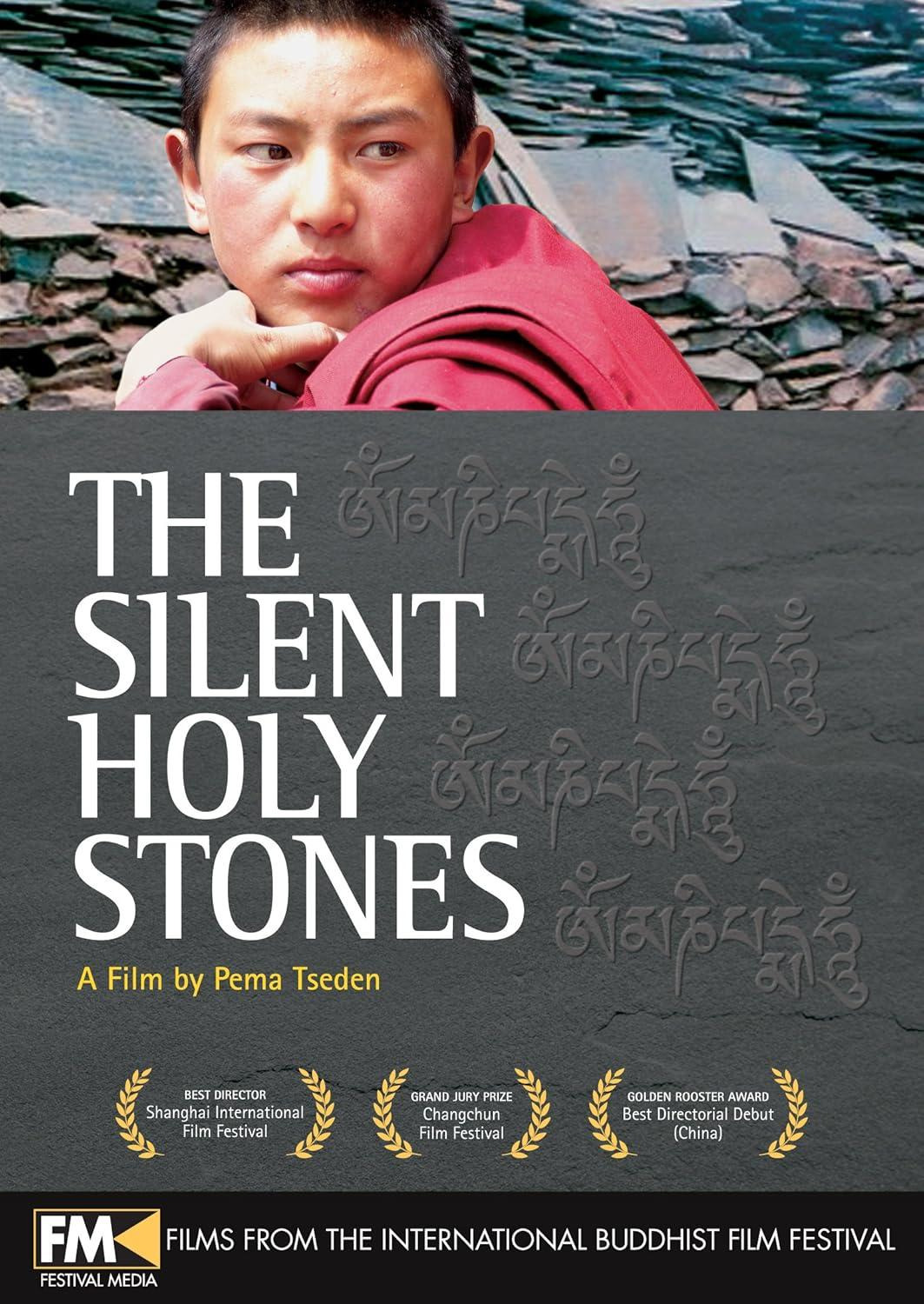
Título: The Sun Behind the Clouds: Tibet’s Struggle for Freedom ("El sol detrás de las nubes: la lucha del Tíbet por la libertad")
Directores: Ritu Sarin y Tenzing Sonam
Year: 2009
País: India/Reino Unido
Idioma: inglés/tibetano
Genre: documentary
Duración: 79 minutos
Tradition: Tibetan Buddhism
Temática: exilio, resistencia no violenta, identidad cultural
Sinopsis: Retrato de la encrucijada tibetana en el exilio, con debates sobre el futuro político y cultural en torno a la no violencia y el liderazgo espiritual.
-----------------------
Título: The Tibetan Book of the Dead 1 & 2 («El Libro Tibetano de los Muertos 1 y 2»)
Directors: Yukari Hayashi, Barrie McLean
Year: 1994
Country: Canada
Language: English
Genre: documentary
Duration: 46 minutes (part 1) and 45 minutes (part 2)
Tradition: Tibetan Buddhism
Subject: teachings and practices related to "The Tibetan Book of the Dead".
Synopsis: This two-part documentary, narrated by Leonard Cohen, explores "The Tibetan Book of the Dead," an ancient spiritual guide from the Himalayas. The first part, "A Way of Life," investigates the book's history, its application in India and its acceptance in the West, including interviews and rituals with the Dalai Lama. The second part, "The Great Liberation," follows a lama and a young monk as they guide a deceased person into the afterlife, showing Tibetan beliefs about the state of "bardo" after death.
-----------------------
Title: Le Vénérable W ("The Venerable W")
Director: Barbet Schoeder
Year: 2017
Country: France
Language: French
Genre: documentary
Duration: 1 hour 47 minutes
Tradition: Tibetan Buddhism
Subject: Tensions between Muslims and Buddhists in Myanmar.
Synopsis: A look at the religious tensions between Muslims and Buddhists through the portrait of Buddhist monk Ashin Wirathu, who leads the anti-Muslim movement in Myanmar.
------------------------
Title: The Yamaguchi story Buddhism and the family in contemporary Japan
Director: Jamie Hubbard
Year: 2009
Country: Japan
Language: Japanese
Genre: documentary
Duration: 48 minutes
Tradition: Buddhism
Theme: Exploration of Buddhism in contemporary Japan
Synopsis: This is a documentary about a Tokyo family discovering the Buddhist tradition. The film explores modern Buddhism in Japan, encouraging discussions of doctrine, practice and institutions. Although it focuses on the current state of Buddhism, it shows only some facets of its diversity in contemporary Japanese society.
-----------------------
Title: The Yogis of Tibet
Director: Jeffrey M. Pill
Year: 2002
Country: USA
Language: English
Genre: documentary
Duration: 1 hour and 17 minutes
Tradition: Tibetan Buddhism
Thematic: discovery and revelation of Tibetan culture to the Western world.
Synopsis: For the first time, Tibetan monks have agreed to share their philosophy and allow their ancestral practices to be filmed. Tibet, long shrouded in myth and isolated from the world, was a mystery to the West. When Western explorers entered Tibet in the late 19th century, they brought with them images that fueled stories of a mythical Shangri-La, a peaceful land ruled by compassion and free of conflict.
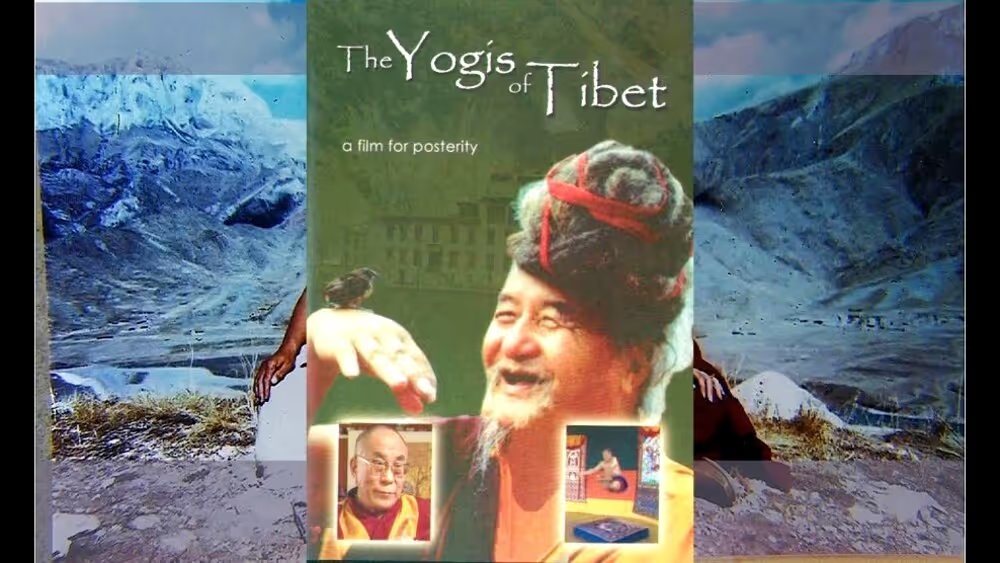
Título: The Zen Mind («La mente zen»)
Director: Jon Braeley
Year: 2006
País: EE. UU./Japón
Idioma: inglés/japonés
Genre: documentary
Duration: 60 minutes
Tradition: Zen Buddhism
Temática: prácticas en monasterios japoneses.
Sinopsis: explora la meditación zazen y la vida en templos zen de Japón, con entrevistas a maestros y escenas de rutinas diarias para entender la mente iluminada.

Título: The Zen of Bennett («El zen de Bennett»)
Director: Unni Straume
Year: 2012
Country: USA
Language: English
Genre: documentary
Duración: 84 minutos
Tradición: budismo zen (aplicado a la música)
Temática: creatividad y mindfulness en el arte.
Sinopsis: sigue al cantante Tony Bennett en la grabación de un álbum, revelando cómo principios zen influyen en su enfoque a la vida y la música.
---------------------------
Título: Tibetan Warrior («Guerrero tibetano»)
Director: Dodo Hunziker
Year: 2015
Country: Switzerland
Idioma: inglés/tibetano
Genre: documentary
Duración: 84 minutos
Tradition: Tibetan Buddhism
Temática: activismo no violento.
Sinopsis: perfil de Loten Namling, músico y activista tibetano, que usa arte y budismo para protestar contra la ocupación china, combinando espiritualidad y resistencia.
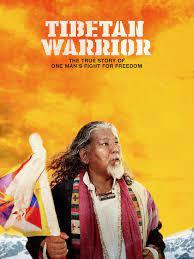
Título: Travellers and Magicians («Viajeros y Magos»)
Director: Khyentse Norbu
Year: 2003
Country: Bhutan
Language: dzongkha
Genre: drama
Length: 108 minutes
Tradition: Tibetan Buddhism
Theme: the conflict between personal aspirations and limiting circumstances,
Synopsis: The story follows Tshewang Dendup, a government official dissatisfied with his job in a remote area, who dreams of moving to the United States. He has heard that there one can earn more money picking fruit in a day than he earns in a month back home. A friend living in New York has promised to help him, but he needs to get there before an approaching deadline. On his way to Thimphu, the capital, he misses the only public transportation available that week. While waiting for another vehicle to pass, he overhears a monk telling stories about magic and travel.
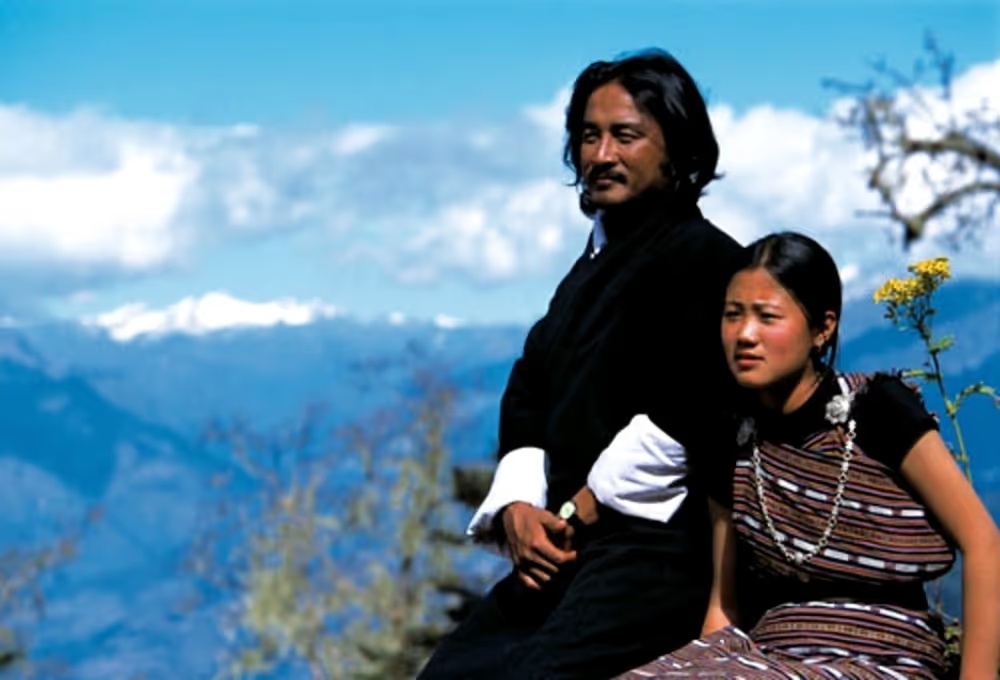
Title: Tulku
Director: Gesar Mukpo
Year: 2009
Country: Canada
Language: English
Genre: documentary
Duration: 75 minutes
Tradition: Tibetan Buddhism
Theme: identity and culture shock.
Synopsis: The film examines Tibetan masters called "tulkus", recognized as reincarnated Buddhas. Since the 1970s, some tulkus have been born in the West, leading them to face culture shock and identity confusion. These tulkus must balance their spiritual heritage with modern life, facing unique challenges in the process.








